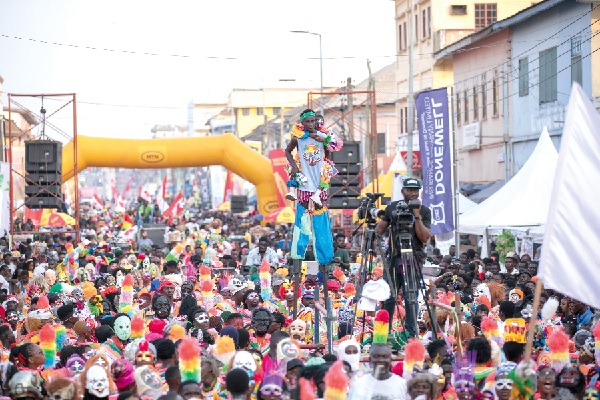The December In GH, a vibrant mix of concerts, fashion shows, traditional cultural festivals, private parties, sporting events, adds to Ghana’s progress in positioning itself as a premier destination for travel and exploration.
The back-to-back cocktail of events crafted as part of the country’s successful hosting of the Year of Return has resulted in one of the most effective means of attracting international arrivals that induce tourist expenditures and eventually helping to stimulate the economy.
Impact
About 115,000 people were expected to participate in December 2023 for “December In GH” activities compared to 108,000 in December 2022.
The 2023 December In GH festivities recorded extraordinary success; the GTA endorsed 183 events which brought substantial economic gains to the country. The arts, fashion, and food sectors benefited from this increase in economic activities.
The aviation industry experienced heightened demand, hotels reported 70 to 80 per cent patronage, and fully booked airlines, hotels, and local events were recorded during that period. These festivities positively impacted the local economy.
Tourism is a significant tool to promote economic development for many developing countries.
Three months after the COVID-19 pandemic, countries across the African continent lost more than $55 billion in travel and tourism revenues.
Ghana’s tourism sector plays a crucial role in the country’s development, contributing to economic growth, job creation and government tax revenue.
Tourism is one of the largest contributors to Gross Domestic Product (GDP) and a recipient of foreign investment.
The Ministry of Tourism, Arts, and Culture estimated that the sector accounted for 4.9 per cent of GDP in 2018, making it the fourth-largest contributor after cocoa, gold and oil.
That year, the tourism sector supported a total of 602,425 both indirect and direct jobs, compared to 550,000 in 2017.
In 2019, travel and tourism accounted for 5.9 per cent of Ghana’s GDP, with revenue of $3.7bn.
There were 411,000 international arrivals in the first nine months of 2021, compared to the 355,000 arrivals observed in 2020: this being a result of a recovery from the pandemic.
Challenges
The arrival of many tourists certainly will lead to challenges such as traffic congestion, crowded public spaces, impacting the environment negatively through waste accumulation, deterioration of natural habitats, and pollution due to a large number of cars and aeroplanes moving from one destination to another resulting in the emission of carbon dioxide.
In an article by, Ekow Quandzie, (Assistant Head of PR at Global Media Alliance on ‘A greener “Detty December” in Ghana: Reducing carbon footprints’, he provides practical ways of reducing carbon footprints associated with vehicular movements.
Solutions such as carpooling, ridesharing, community shuttles, public transportation, or transportation provided through a partnership between transport owners and event organisers are part of his suggestions.
These, he said could help reduce the number of individual vehicles on the road and suggested the implementation of park-and-ride facilities to help reduce traffic congestion around the venue of the events.
This is where I believe the Ghana Tourism Authority could explore ways to make December In GH more inclusive and accessible to a larger part of the population, perhaps through incentivising discounted prices for the residents or facilitating the participation of small businesses in the events and ensuring that the local community benefited from the festivities.
Some of the gate fees for these events are way out of the pockets of the ordinary Ghanaian. More realistic and affordable tickets would encourage “local tourists” to also be part of the fun activities. In effect, 10,000 attendances at a fee of GH¢100 is better than a GH¢10,000 ticket with an attendance of 100.
While the event was a national project, the fact remains that the city of Accra accounted for about 90 per cent of all the events. Therefore, there must be a conscious effort to decentralise this project nationally.
This can only be done if resources are allocated to other regions to develop their tourist potential. Ghana abounds in many tourist destinations that stretch from the southern part to the northern region. Spreading the fun therefore would help drive the local economies.
In addition, this would help reduce the development gap between the different regions making it easier to promote these regions as tourist sites instead of focusing most of the events in the capital.
Thus, avoiding the strain on infrastructure during the peak period of festivities in Accra and creating more infrastructure in the other regions to accommodate the growing number of tourists.
In conclusion, the Ghana Tourism Authority's December In GH initiative is a commendable attempt that has significantly contributed to the cultural vibrancy and economic growth of the country through tourism during the festive season.
While recognising its strengths, addressing logistical challenges, enhancing environmental sustainability, and fostering inclusivity are areas that could ameliorate the success of this initiative.

